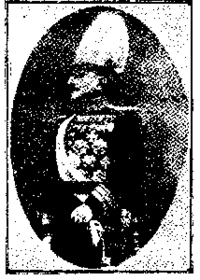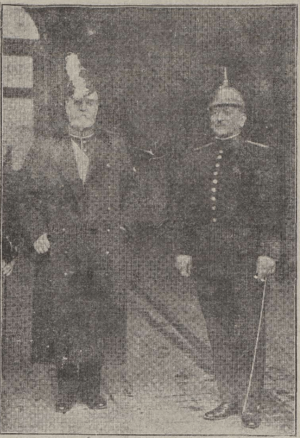José Olaguer Feliú facts for kids
Quick facts for kids
José Olaguer Feliú y Ramírez
|
|
|---|---|
 |
|
Spanish Minister of War |
|
| In office 8 March 1922 – 15 July 1922 |
|
| Monarch | Alfonso XIII |
| Preceded by | Juan de la Cierva y Peñafiel |
| Succeeded by | José Sánchez-Guerra y Martínez |
| Personal details | |
| Born | October 25, 1857 Manila, Captaincy General of the Philippines |
| Died | November 21, 1929 (aged 72) Madrid, Spain |
| Nationality | Spanish |
| Spouse | Josefina García |
| Awards | |
| Military service | |
| Years of service | 1876-1927 |
| Rank | Lieutenant General |
| Commands | Captain General of Catalonia |
| Battles/wars | Philippine Revolution |
José Olaguer Feliú y Ramírez (born October 25, 1857 – died November 21, 1929) was an important Spanish general and politician. He served as a lieutenant general in the army and even became the Minister of War for Spain. He was known for his military service in the Philippines and for making improvements to the Carabineros, a special police force.
Contents
Biography
Early Life and Military Career
José Olaguer Feliú was born on October 25, 1857, in Manila, which was then part of the Spanish Philippines. His parents were Spanish, from Catalonia. In 1876, when he was 19, he joined the Academy of the General Staff to become a military officer.
In 1882, he became a lieutenant and worked in various places across Spain.
Service in the Philippines
In 1890, Olaguer Feliú went to the Philippines as a commandant (a military rank). While there, he also directed the School of Arts and Crafts in Manila.
He played a big part in many military actions during the Philippine Revolution. For example, he fought in the Battle of Kakarong de Sili on the island of Luzon on January 1, 1897. In this battle, Commandant Olaguer Feliú and his 600 men won against about 6,000 local fighters called Katipuneros. Because of this victory, he was promoted to lieutenant colonel and received the special Laureate Cross of Saint Ferdinand award.
After this, he became the Chief of Staff for the main military officer in Luzon. A year later, he was promoted again to colonel for his good work in the province of Zambales.
When the Spanish–American War started with the United States, Olaguer Feliú stayed in Manila. He did important work during the siege and blockade of Manila. As a senior officer, he was involved in the surrender of the city.
Return to Spain and Promotions
In 1898, he returned to mainland Spain as a colonel. In 1902, he became the chief of staff for the military command in Galicia.
He continued to rise through the ranks. In 1910, he became a Brigade General. He then served as Chief of Staff of the Second Region until 1915. After that, he was promoted to divisional general and given command of the Second Division.
Olaguer Feliú received several important awards during these years. In 1912, he was given the Grand Cross of the Order of Military Merit. In 1916, he received the Grand Cross of the Royal and Military Order of San Hermenegildo.
In 1917, he was appointed Military Governor of Cádiz and also took command of the Ninth Division. In 1918, he became a member of the Royal Hispanic-American Academy of Cadiz.
By 1921, he was promoted to lieutenant general. He took command of the military in Catalonia until 1922.
Minister of War
In March 1922, Lieutenant-General Jose Olaguer Feliú was chosen by José Sánchez Guerra, who was the Prime Minister of Spain, to be the Minister of War.
Being Minister of War was a very challenging job at that time. Spain was dealing with a difficult war in Morocco, especially after a major military defeat in July 1921. There were also many debates in the government and the public about what went wrong. Olaguer Feliú resigned from this position in July 1922.
Later Career and Reforms
After his time as Minister of War, he was appointed Captain General of the Fifth Region of Aragon.
In August 1923, Olaguer Feliú became the Director General of the Carabineros of Spain. This was a special force that guarded borders and customs. He worked hard to make things better for the Carabineros. He reduced their daily working hours to twelve hours. He also improved their training schools and arranged for barracks to be repaired and new ones built. He even created schools for the children of Carabineros. These improvements were made even though the government had a tight budget. He also helped more orphan students get into special colleges.
In 1924, he received another award, the Grand Cross of Christ, from the government of Portugal.
In 1925, he became a member of a special board that reviewed promotions for generals and colonels in the army. In 1927, he was chosen as a representative for the National Consultative Assembly, a government body, and stayed in this role until 1928.
In 1927, by order of the King, Lieutenant General José Olaguer Feliú retired from his role as Director General of Carabineros and moved into the first reserve.
José Olaguer Feliú died in Madrid on November 21, 1929.
Images for kids
See also
 In Spanish: José Olaguer-Feliú para niños
In Spanish: José Olaguer-Feliú para niños



